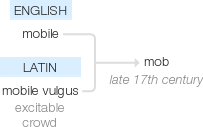Mob
late 17th century: abbreviation of archaic mobile, short for Latin mobile vulgus ‘excitable crowd’.
wiktionary
From Middle English mob, short for mobile, from Latin mōbile (vulgus)(“fickle (crowd)”). The video-gaming sense originates from English mobile, used by Richard Bartle for objects capable of movement in an early MUD.
Alteration of mab.
Abbreviation of mobile phone.
etymonline
mob (n.)
1680s, "disorderly part of the population, rabble, common mass, the multitude, especially when rude or disorderly; a riotous assemblage," slang shortening of mobile, mobility "common people, populace, rabble" (1670s, probably with a conscious play on nobility), from Latin mobile vulgus "fickle common people" (the Latin phrase is attested c. 1600 in English), from mobile, neuter of mobilis "fickle, movable, mobile" (see mobile (adj.)).
Mob is a very strong word for a tumultuous or even riotous assembly, moved to or toward lawlessness by discontent or some similar exciting cause. Rabble is a contemptuous word for the very lowest classes, considered as confused or without sufficient strength or unity of feeling to make them especially dangerous. [Century Dictionary, 1897]
Also used of a promiscuous aggregation of people in any rank of life (1680s), and in Australia and New Zealand used without disparagement for "a crowd." Meaning "gang of criminals working together" is from 1839, originally of thieves or pick-pockets; the American English sense of "organized crime in general" is from 1927.
The Mob was not a synonym for the Mafia. It was an alliance of Jews, Italians, and a few Irishmen, some of them brilliant, who organized the supply, and often the production, of liquor during the thirteen years, ten months, and nineteen days of Prohibition. ... Their alliance — sometimes called the Combination but never the Mafia — was part of the urgent process of Americanizing crime. [Pete Hamill, "Why Sinatra Matters," 1998]
Mob scene "crowded place" is by 1922, from earlier use in reference to movies and theatrical productions; mob-rule "ochlocracy" is by 1806.
mob (v.)
"to attack in a mob, crowd round and annoy or beset," transitive, 1709, from mob (n.). Meaning "to form into a mob" is from 1711. Related: Mobbed; mobbing.
